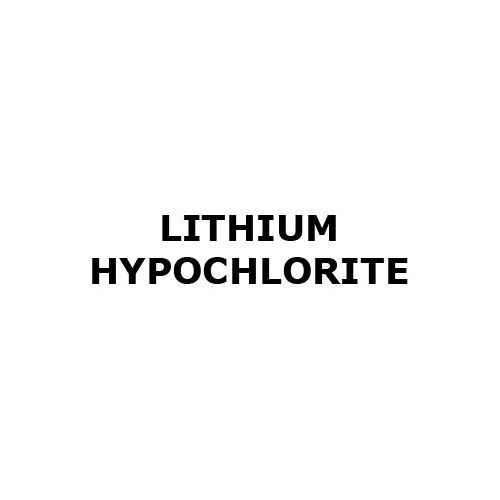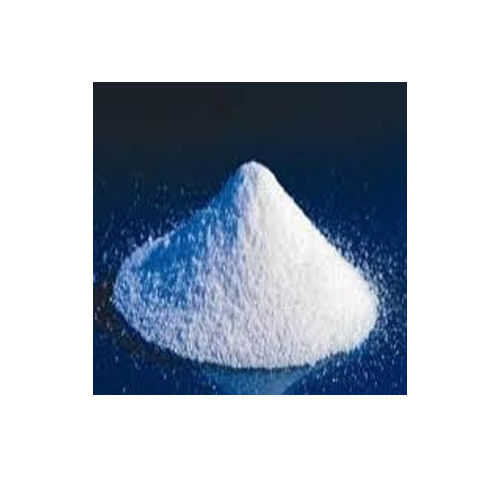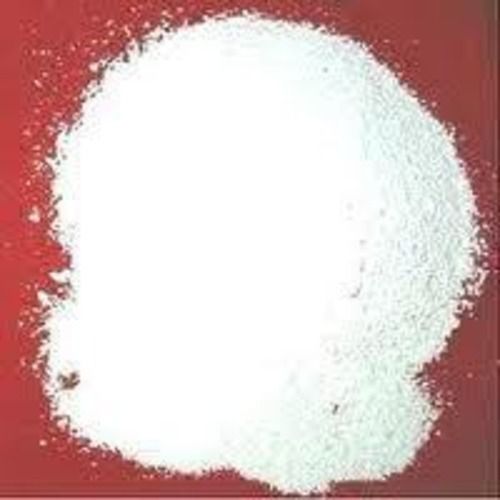
Lithium Hypochlorite
60 INR/Gram
Product Details:
- Form Powder
- Storage Room Temperature
- Classification Organic Chemicals
- Grade Industrial Grade
- Type Lithium Hypochlorite
- Application Industrial
- Click to view more
X
Lithium Hypochlorite Price And Quantity
- 60 INR/Gram
- 50 Gram
Lithium Hypochlorite Product Specifications
- Room Temperature
- Lithium Hypochlorite
- Powder
- Organic Chemicals
- Industrial
- Industrial Grade
Lithium Hypochlorite Trade Information
- 50 Gram Per Month
- 2-12 Week
Product Description
Being the quality focused manufacturer exporter and supplier our organization is betrothed to offer Lithium Hypochlorite. This chemical is used as a reagent in many chemical reactions and also as a disinfectant for cleaning water in pools. The offered chemical is processed under the stern guidance of our skilled professionals by utilizing optimal quality basic compounds and advanced methodology in tune with international quality standards. Apart from this we are offering this chemical compound to our clients in various packaging options at market leading prices.
Lithium Hypochlorite Properties:
1. CAS Number: 13840-33-0
2. Chemical formula: LiOCl
3. Molar mass: 58.39 g/mol-1
4. Appearance: Colorless or white crystalline solid
5. Odor: chlorine-like odor
6. Density: 0.531 g/cm3
7. Melting point: 135 degree centigrade
8. Boiling point: 1,336 degree centigrade
9. Solubility in water: Soluble
Lithium Hypochlorite Applications:
1. Swimming Pool Sanitation: Lithium hypochlorite is commonly used in swimming pools to disinfect and sanitize the water. It effectively kills bacteria, viruses, and algae, helping to maintain clean and safe swimming conditions.
2. Water Treatment: It is used in the treatment of drinking water and wastewater. Lithium hypochlorite helps to eliminate harmful microorganisms present in water sources, making it safe for consumption and other purposes.
3. Surface Disinfection: Lithium hypochlorite can be used to disinfect surfaces in various settings, including hospitals, laboratories, and food processing facilities. It helps to control the spread of pathogens and ensure a hygienic environment.
4. Algae Control: In addition to its use in swimming pools, lithium hypochlorite can also be used to control algae growth in ponds, lakes, and other water bodies. By inhibiting algae growth, it helps to maintain the ecological balance of aquatic ecosystems.
5. Cleaning and Sanitizing Equipment: Lithium hypochlorite solutions are used for cleaning and sanitizing equipment and utensils in food processing plants, restaurants, and other food-related industries. It helps to prevent contamination and ensure food safety.
6. Disinfection in Healthcare Settings: Lithium hypochlorite is utilized in healthcare settings for disinfecting medical equipment, surfaces, and instruments. It plays a crucial role in preventing the spread of infections in hospitals, clinics, and other healthcare facilities.
7. Mold and Mildew Removal: Lithium hypochlorite can be effective in removing mold and mildew from surfaces such as walls, floors, and ceilings. Its disinfectant properties help to eliminate fungal growth and prevent its recurrence.
8. Household Disinfection: It can be used for general household disinfection purposes, such as sanitizing kitchen and bathroom surfaces, cleaning floors, and disinfecting laundry.
Lithium Hypochlorite FAQ:
1. What forms does lithium hypochlorite come in?
Lithium hypochlorite is typically available in granular or powdered form, which can be dissolved in water to create a solution for various disinfection applications.
2. How does lithium hypochlorite work as a disinfectant?
When dissolved in water, lithium hypochlorite releases hypochlorous acid (HOCl), a powerful disinfectant that effectively kills bacteria, viruses, algae, and other microorganisms by oxidizing their cellular components.
3. How should lithium hypochlorite be handled and stored?
Lithium hypochlorite should be handled with care and stored in a cool, dry, well-ventilated area away from heat, direct sunlight, and incompatible substances. It should be kept in tightly sealed containers to prevent moisture absorption and contamination. Proper personal protective equipment (PPE) should be worn when handling the compound, including gloves, goggles, and protective clothing.
4. What safety precautions should be followed when using lithium hypochlorite?
Users should carefully read and follow the manufacturer's instructions and safety data sheets (SDS) when handling lithium hypochlorite. It should never be mixed with other chemicals unless recommended by a qualified professional. Avoid inhaling its dust or fumes and avoid contact with skin, eyes, and clothing. In case of accidental exposure or ingestion, seek medical attention immediately.
5. Can lithium hypochlorite be used as a substitute for other disinfectants?
Lithium hypochlorite can be used as an alternative to other chlorine-based disinfectants such as calcium hypochlorite or sodium hypochlorite in many applications. However, its suitability depends on factors such as the specific disinfection requirements, compatibility with other chemicals, and regulatory considerations.
6. Is lithium hypochlorite environmentally friendly?
While lithium hypochlorite is effective as a disinfectant, its use should be carefully managed to minimize environmental impact. Proper dosage, handling, and disposal practices are essential to prevent contamination of water bodies and ecosystems.
Tell us about your requirement

Price:
Quantity
Select Unit
- 50
- 100
- 200
- 250
- 500
- 1000+
Additional detail
Mobile number
Email
Other Products in 'Lithium' category
 |
AXIOM CHEMICALS PVT. LTD
All Rights Reserved.(Terms of Use) Developed and Managed by Infocom Network Private Limited. |








 Call Me Free
Call Me Free